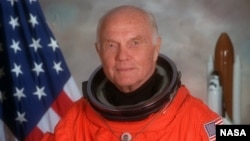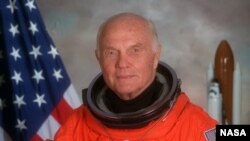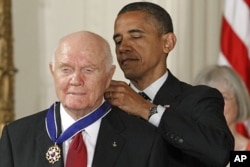John Glenn, the first U.S. astronaut to orbit the earth, has died at age 95, officials said.
Glenn passed away Thursday, more than a week after being admitted to the Ohio State University's James Cancer Hospital. The John Glenn College of Public Affairs at OSU made the announcement.
U.S. President Barack Obama issued a statement saying that with Glenn's passing, "our nation has lost an icon and Michelle and I have lost a friend." He commended Glenn for a lifetime of breaking barriers, including setting a transcontinental speed record and becoming the oldest man ever to go into space.
Glenn was the last surviving member of a group known as "the Mercury 7" - seven military test pilots selected in 1959 to become America's first astronauts.
"The last of America's first astronauts has left us," Obama said in his statement, "but propelled by their example, we know that our future here on Earth compels us to keep reaching for the heavens."
President-elect Donald Trump took to Twitter to react to Glenn's passing. "Today we lost a great pioneer of air and space in John Glenn. He was a hero and inspired generations of future explorers. He will be missed," Trump said.
Ellen Ochoa, the director of NASA's Johnson Space Center in Texas, said Thursday: "Our nation has lost a pioneer who contributed immensely to human space flight and inspired so many around the world. ... While we have lost an American hero, we know Senator Glenn's legacy and pioneering spirit will live on through the work we carry out each day as we continue to advance human space exploration for the benefit of humanity."
After serving as a military pilot in World War II and the Korean conflict, Glenn was a test pilot on U.S. Navy and Marine Corps jet fighters and won a place in the first class of U.S. astronauts assembled by the National Aeronautics and Space Administration, or NASA, in 1958.
Glenn became the first U.S. astronaut to orbit the Earth, flying a ship called the Friendship 7 around the world three times in a nearly five-hour flight on February 20, 1962.
During that flight, Glenn told flight engineers back on Earth a phrase for which he became known: "Zero G, and I feel fine." Glenn meant that he had achieved weightlessness in space, or "zero gravity."
Glenn also had political aspirations. A lifelong Democrat, he ran for a U.S. Senate seat for Ohio in 1964. He was unsuccessful, but won a seat 10 years later, defending attacks on his military record in comments that came to be known as the "Gold Star Mothers" speech.
During the 1974 primaries, opponent Howard Metzenbaum accused Glenn, a career military man, of never holding a real job. Glenn retorted, "You go with me to any Gold Star mother [a mother whose child has died in active U.S. military service] and you look her in the eye and tell her that her son did not hold a job."
Glenn went on to win that election and remained a member of the U.S. Senate until 1999. In the months before his death, he was the oldest living former member of the Senate.
In Pictures:
Glenn made his final trip into space in 1998, at age 77. His participation in the 9-day mission of the space shuttle Discovery was criticized by some as folly. But supporters noted that data on Glenn's physical state during flight could be compared with his records from more than three decades earlier, providing valuable data on how space flight affects the body at different ages.
After leaving the Senate in 1999, Glenn helped to found a public service school at The Ohio State University, which later became the John Glenn College of Public Affairs. He served as an adjunct professor at that school.
Glenn went on to win numerous accolades, including honorary degrees at a number of universities, the Woodrow Wilson Award for Public Service, a U.S. Senate public service award, and the Presidential Medal of Freedom.









